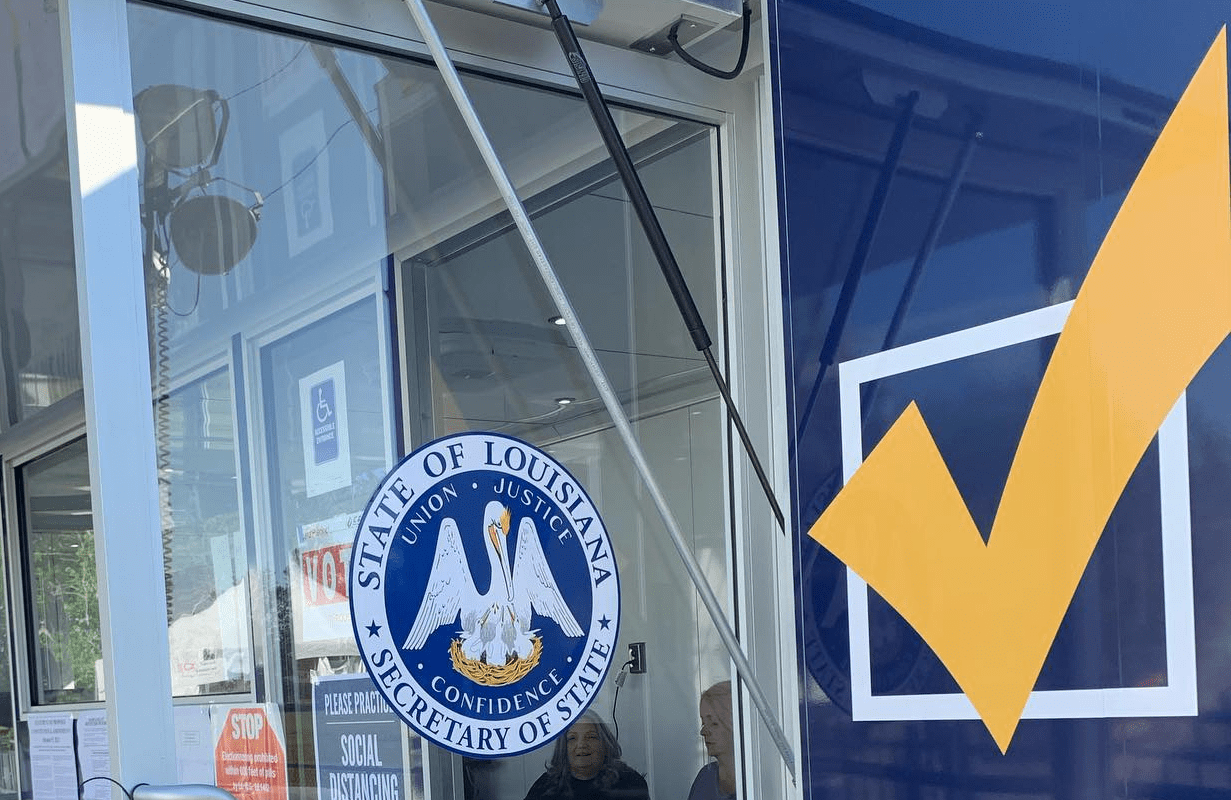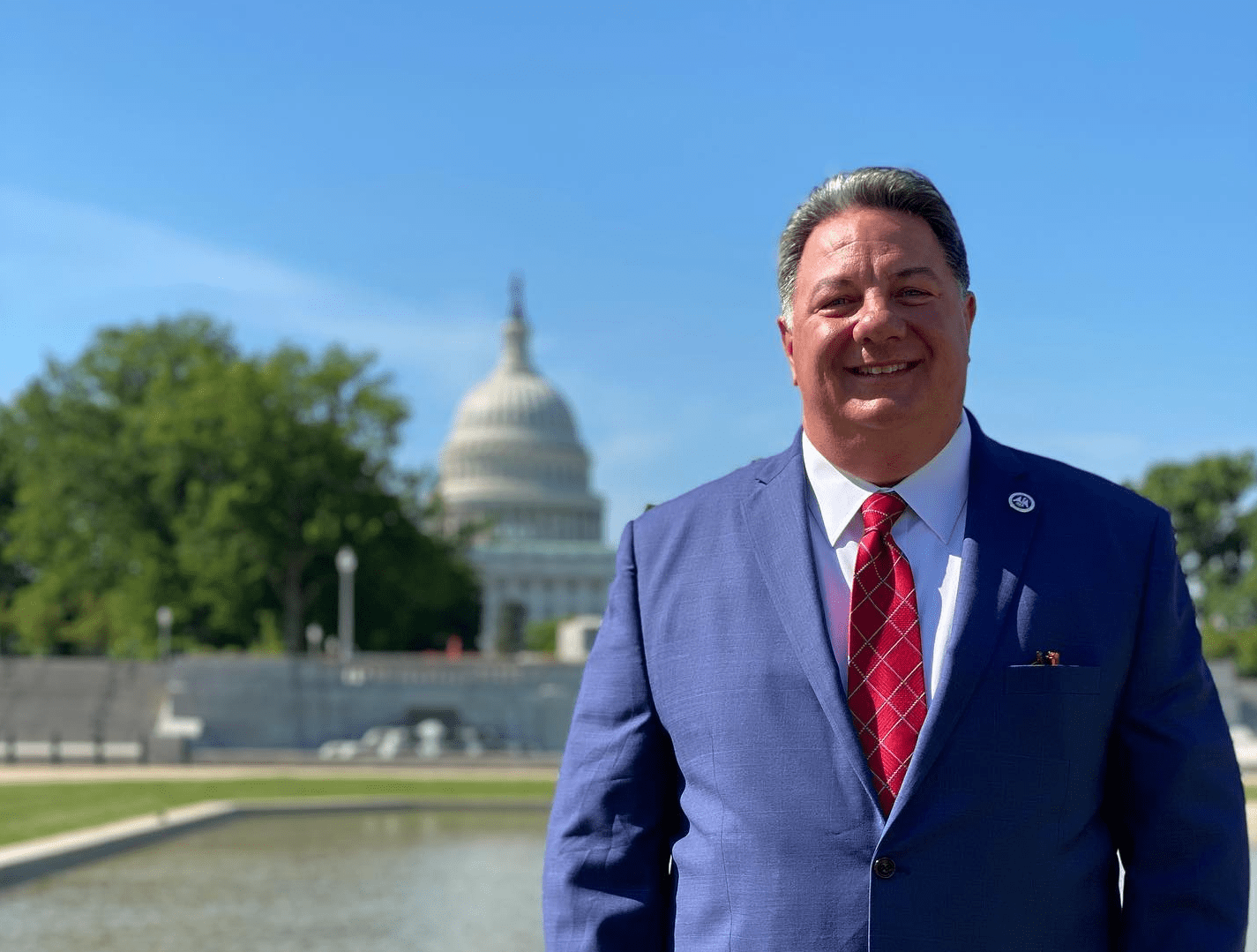Election Conspiracies Loom Over Louisiana’s Secretary of State Race
The state’s chief elections official tried to appease the far right before calling it quits. The crowd running to replace him risks falling in the same trap.
Cameron Joseph | October 5, 2023


Editor’s note (Nov. 19): Republican Nancy Landry beat Democrat Gwen Collins-Greenup in the Nov. 18 runoff and will be the next secretary of state of Louisiana, after the two candidates secured the first two spots in the Oct. 14 primary.
Louisiana’s leading Republican candidates for secretary of state have largely rejected calls from election conspiracists to upend the state’s voting system, but they’re still courting GOP base voters who continue to believe Donald Trump’s lies that he won the 2020 election.
Some of the main contenders in next week’s election are playing rhetorical footsie with the hard right in the campaign to replace retiring Republican incumbent Kyle Ardoin, whose own efforts to appease election deniers weakened Louisiana’s voting system without saving his political career.
Whoever replaces him as the state’s next chief election administrator will have to deal with continued pressure from conspiracists while making decisions about everything from administering the 2024 presidential election to replacing Louisiana’s aging voting equipment.
Louisiana uses touchscreen electronic voting machines that are almost two decades old and prone to error, and do not include a paper ballot printout, making results impossible to audit. State officials have been mulling how to replace the equipment for years now to address these concerns but their efforts have repeatedly stalled, and far-right conspiracists have jumped into the fray to push for a radical reboot of the election system.
Brandon Trosclair, the most hardline candidate in the race, wants to switch to hand-counting elections, mirroring an approach some far right politicians have pushed around the nation that experts warn would produce inaccurate counts.
Local political observers doubt Trosclair has a real shot at winning the race, and most of the front-running candidates strongly oppose his calls for such a dramatic overhaul while supporting plans to acquire new voting machines with a paper trail.
But two of the top candidates, Ardoin’s lieutenant Nancy Landry and state Speaker Clay Schexnayder, have also hedged their responses to false concerns of widespread fraud in a seeming attempt to appeal to the Republican voters in the state who still believe the game is rigged, a sign that they could fall into the same appeasement trap that Ardoin did in office. On top of that, Jeff Landry, the Louisiana Attorney General who joined Texas’ attempts to overturn the 2020 election in four swing states won by President Biden, is favored to win Louisiana’s governorship this fall, which would hand him more power to pressure the eventual secretary of state on how to run elections.
Schexnayder, Trosclair, and Nancy Landry (no relationship to Jeff Landry) are running in the Oct. 14 primary alongside five other candidates, including Public Service Commissioner Mike Francis, the Republican who is most direct about rejecting election conspiracies. Democrats Gwen Collins-Greenup, an attorney who received 41 percent of the vote in the 2019 runoff for secretary of state, and Arthur Morrell, a former court clerk in New Orleans, will be on the ballot as well.
The top two in the all-party primary will advance to a mid-November runoff regardless of party.
Francis, Landry, and Schexnayder have raised the most money and are the only candidates currently running statewide TV ads, according to local Republicans tracking ad buys. With early voting already underway, at least one of those three Republicans is expected to advance to the runoff, where they would be favored since this is a deep red state. There’s a possibility that the Democratic candidates split their party’s vote and two Republicans advance.
Pearson Cross, a political science professor and associate dean at the University of Louisiana at Lafayette, said the leading Republicans’ message on widespread voter fraud has been “that they’re concerned about it, but it’s not an issue here.”
This attempt to walk a tightrope—defending their own state’s election system while nodding to more general worries about the 2020 elections—was also attempted by other state officials.
Ardoin, the outgoing secretary of state, spent years trying to appease the state’s far right who claimed that Louisiana’s elections were rife with fraud. Ardoin allowed MyPillow CEO Mike Lindell, a leading proponent of disproven election fraud theories, to air his views at an official hearing of the Louisiana Voting Systems Commission.
Ardoin also pulled his state out of the Electronic Registration Information Center (ERIC), a bipartisan, multi-state collaborative effort that monitors whether people illegally vote in multiple states.
More than 30 states run by both Democrats and Republicans were part of ERIC with little controversy until it became a target on the far right when the Gateway Pundit website falsely claimed that it was secretly a “left-wing voter registration drive” bankrolled by liberal billionaire George Soros. Ardoin announced he would quit the program shortly thereafter, at an event hosted by a group of election-denying conservative activists in early 2022. Seven other GOP-controlled states have since followed suit, with Texas officially planning to withdraw later this month.
Every state that leaves ERIC not only limits its own ability to detect voter fraud but hurts the entire endeavor, because it relies on states communicating with each other to identify if a voter casts their ballot in multiple states.


But Ardoin’s actions were not enough for conspiracy theorists, and they continued to hound him throughout his tenure. He decided this spring not to run for reelection, triggering Louisiana’s first secretary of state race without an incumbent since 1987—and slammed them in a statement.
“I hope that Louisianans of all political persuasions will stand against the pervasive lies that have eroded trust in our elections by using conspiracies so far-fetched that they belong in a work of fiction,” Ardoin said. “The vast majority of Louisiana’s voters know that our elections are secure and accurate, and it is shameful and outright dangerous that a small minority of vocal individuals have chosen to denigrate the hard work of our election staff and spread unproven falsehoods.”
Ardoin’s decision to quit ERIC hasn’t come up much at all on the campaign trail, but Francis, one of the leading Republican candidates, told Bolts he planned to rejoin the organization so long as new information didn’t come to light during his technical review. “I plan to go back to that unless something surfaces,”he said.
It’s unclear where Landry and Schexnayder stand—neither has mentioned it on the campaign trail and their campaigns didn’t respond to questions from Bolts about the program.
Kentucky Secretary of State Michael Adams, a Republican who defeated primary challenges from election deniers in May, told Bolts at the time that he wished public officials did not bow to such pressure. Referring to Louisiana, Adams said Ardoin “dropped out of ERIC and did the things that he thought he had to do to survive, and it didn’t work, he got run out of his race.”
“I’ve seen my colleagues in the same job in other states try to feed the tiger,” Adams said. “I’ve seen them make decisions that I think were probably not good for their voters to try to survive a primary and all it does is just validate the conspiracy theories.”
In Louisiana, the secretary of state candidate most invested in these conspiracy theories hasn’t gotten much traction.
As of Oct. 4, Trosclair’s campaign website included a countdown clock to the Nov. 18 runoff, not the October 14 all-candidate election. He’d raised less than $100,000 for the race as of early September campaign finance reports, and has made no ad buys.
“It’s very difficult if you have no money and are trying to sell a narrative that people in this state don’t believe and a system that they don’t want,” Schexnayder adviser Lionel Rainey III said about Trosclair.
One prominent local Republican is helping Trosclair. When Bolts reached out to Trosclair with an interview request, Lenar Whitney, a former state lawmaker and current national committeewoman for the Republican Party of Louisiana with a long history of circulating conspiracies, called back and said that she was working on his campaign. Trosclair never called back.
Trosclair has made clear his lack of faith in the state’s elections in no uncertain terms.
“Safe and secure? I don’t think so,” he said of Louisiana’s system at a candidate forum on Sept. 21. “I don’t trust it at all.”
But some of the other GOP candidates are also courting election deniers, even as they defend their own state’s system.
Nancy Landry’s campaign announcement video criticized election procedures in other states like Arizona and Pennsylvania. And she has hedged when asked if Joe Biden had legitimately won the 2020 election.
“I do think that President Biden is the legitimate president, but I do think there were some very troubling allegations of irregularities in many states,” she said at the same Sept. 21 forum, before adding that Louisiana has “safe, fair and accurate elections.”
“I understand people’s concerns and their lack of confidence in elections. I think most of it is based on what they’ve heard that happened in other states,” she said later.
She has also echoed a conspiracy spread by the far right since the 2020 election, attacking Facebook CEO Mark Zuckerberg for donating funds to help struggling local election offices at the height of the COVID-19 pandemic. “We must also continue efforts to prohibit private funding of elections from California leftists like Mark Zuckerberg,” she said in her announcement video.
Louisiana did not receive any of the Zuckerberg funding in 2020 after Jeff Landry, the attorney general, stepped in to prohibit it. But Louisiana could be on its way to ban any future private elections funding if an amendment question put on the Oct. 14 ballot passes.
Schexnayder won his speakership because of Democratic support and while his relationship with some legislative Democrats soured in recent years, he’s seen as more of a moderate than Landry. But he, too, has taken the tack that Louisiana’s elections are safe while stoking concerns about how other states and the feds handle elections, saying in an August TV interview that he wanted to ensure “we don’t have any overreach from the federal government to come in and manipulate elections.”
He has promised to create a board to “investigate all and any allegations made towards election irregularities”—a move that would mirror the creation of new investigative bodies in other red states, spurred by unfounded concerns of widespread fraud.
Francis, a wealthy oilman and former state party chairman, has expressed significantly more skepticism of voting fraud theories than the other candidates.
“I voted for Trump. I’m very conservative,” he told Bolts. “I don’t agree that the election was stolen from him, because there’s no proof of that. I’ve been watching the news and all of the conspiracy theorists. Give me the proof that it was stolen.”
He still plans to give these theories air time, saying that as secretary of state he would organize a “technical conference” to test “all these accusations about the wrongdoing.” But he said he hopes that the conference might help convince them that “we have good solid elections.”
One reason that Louisians who are spreading lies about the 2020 election are so fired up is because Louisiana’s machines are leased from Dominion Voting Systems, which Trump and his allies have falsely claimed were involved in rigging the elections.
For Trosclair and his allies, the solution is switching to an all-paper system with hand-marked and hand-counted ballots. That idea has been promoted by Trump allies like Lindell, the CEO of MyPillow, but elections experts say it would be much more prone to error.
The leading candidates have distanced themselves from proposals for hand-counting: They say they want to replace the old machines with new ones that will provide a paper backup in case anything goes wrong with the count and to audit the system.
But they’ve also acknowledged that voting machines may be unpopular with the GOP base.
“Don’t boo me, but we do have Dominion machines,” Schexnayder joked at a recent event, before explaining that they were secure. He promised that the updated machines would follow a similar model, while also creating an auditable paper trail.
Landry and Francis have similarly said they’d acquire new machines with an auditable paper trail, as has Collins-Greenup.
At a recent candidate forum, Trosclair declared “If you live in Louisiana and you think our elections are just fine there are seven other candidates that are going to change very little or nothing about the process.”
He may be right—but his opponents’ rhetoric during the campaign shows how powerful his movement remains in Louisiana politics.
Sign up and stay up-to-date
Louisiana Votes
Bolts is closely covering the ramifications of Louisiana’s 2023 elections for voting rights and criminal justice.




